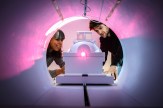A Web of trust
In a new study of the Internet’s impact on politics, Northeastern professor David Lazer and his colleagues found that online town hall meetings increase constituents’ trust and approval of members of Congress. The groundbreaking study also found that online deliberative forums are likely to sway swing voters in favor of the lawmaker holding the online forum. Read the full study.
Additionally, Lazer and his colleagues found that online town halls attract people with demographics not traditionally engaged in politics. These events also make people more likely to vote, talk politics and persuade others to vote.
Funded largely by the National Science Foundation as part of the “Connecting to Congress” project, the research was facilitated by the Congressional Management Foundation. Lazer and his team conducted 21 online town hall meetings with 12 representatives and one senator, and surveyed randomly selected participants over the course of several months between 2006 and 2008. The topics discussed included immigration and detainee policy.
“The role of the Internet in presidential politics has received much scholarly and popular attention, but little has been done to understand its power to transform the relationship between members of Congress and their constituents,” said Lazer, associate professor of political science and computer science at Northeastern, and director of the Program on Networked Governance at Harvard. “Our findings will hopefully be the catalyst for a more meaningful and effective engagement between lawmakers and the public.”
The online town halls’ power to increase political discourse among voters extended well beyond the forums’ participants. Constituents of these online forums were more likely to engage in discussions with others about politics and policy issues and persuade them to vote similarly.
“It is clear that these sessions offer a very effective way to reach many constituents and, combined with traditional means of communication, can help further strengthen the ties between members of Congress and those they represent,” added Lazer.
In addition to the NSF grant, the study also received funding from Harvard’s Ash Institute for Democratic Governance and Innovation. The authors also include Michael Neblo of Ohio State University, Kevin Esterling of University of California-Riverside, and Kathy Goldsmith of the Congressional Management Foundation.





